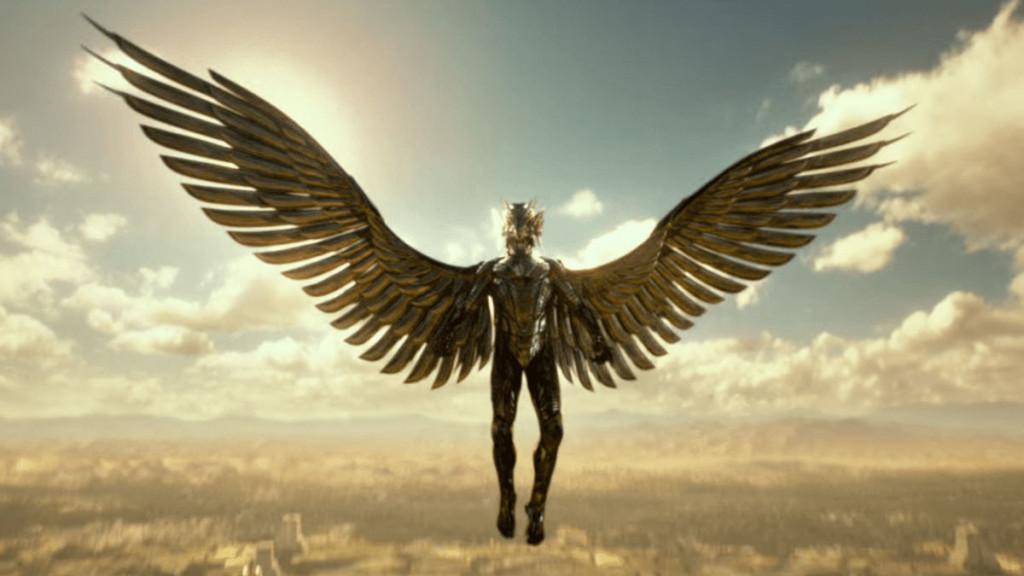The mighty creator-god Ra (Geoffrey Rush) ferries his sun boat across the cosmic sky, shedding light and lens flares on Egypt’s great empire during the age of computer-generated imagery and semi-whitewashed ethnic dubiousness. The god Horus (Nikolaj Coster-Waldau) is in the middle of his coronation ceremony to become king of the gods when suddenly his chaotic uncle Set (Gerard Butler) crashes the party. Set has brought with him a vengeance against Horus and his own brother, Osiris (Bryan Brown), as well as a piddly army of masked spearmen. With a mighty blade, Set kills Osiris. Now with Osiris in his death throes, the other gods all cower in fear for no reason, leaving Horus to fight Set alone. In the ensuing skirmish of semi-epic proportions, Horus and Set become terrible flying beasts and battle, with Set’s eventually gaining the upper hand and stealing Horus’ all-seeing eyes.
Egypt is surely doomed. Or rather, the national gross for Lionsgate’s 2016 fantasy epic “Gods of Egypt,” directed by Alex Proyas, is surely doomed. “Gods of Egypt” follows the vast journey of Bek (Brenton Thwaites), a mortal thief who seeks to free his true love, Zaya (Courtney Eaton), from Set’s evil rule over Egypt. Bek is a standard, Aladdin-type rogue with a heart of gold who is quick on his feet, plays by his own rules and spouts so many quips and one-liners that he could be buried in them. He steals one of the eyes of Horus from Set and takes it to Horus himself. Meanwhile, the other Egyptian gods seem to have forgotten that they’re powerful gods and doltishly fight Set’s army single-handedly as Set ravages the country, stealing their body parts for his ultimate plan to defeat Ra and let loose the apocalyptic monster Apophis on Egypt, although in historically accurate Egypt, the beast would be called Apep.
To retrieve his other eye and reclaim his place as king against all odds — and because at this point, he’s lost most of his dignity — Horus teams up with Bek. The two, naturally, don’t get along, with Horus’ being hubristic and harsh and Bek’s being lovable and cunning. What follows is a barrage of Egyptian mythology–inspired, generic three-act adventure movie tropes. Unfortunately, this trope-fest also carts the mummified husk of lazily written characters and plot holes in its war chariot.
Despite the presence of two separate love stories within the film, between Horus and the goddess Hathor (Elodie Yung), and between Bek and Zaya, it isn’t convincing actingwise. The same can be said for chemistry. The acting and storyline, in general, are problematic for the film. Horus’ hero journey is a redemption story that, in itself, needs redemption. He makes unintelligent decisions, tries to hide behind backstory to get empathy and is a generally unlikeable protagonist.
Because of critics’ raving distaste, the film’s “appeal” has lead to an extremely low rating of 13 percent on Rotten Tomatoes and 23 percent on Metacritic. Without a doubt, it is going to flop majorly, but the $140 million budget was clearly used neither on talent nor on the screenplay. Instead, the audience will get to witness the lavish and fantastical world of CGI Egypt and all the CG eye-candy that comes with it. It can’t go without saying that in all its computerized glory, there is the occasional colorful wonder or interesting design that dots the barren landscape. Some areas, such as Ra’s floating fortress or Thoth’s palace, will garner momentary interest. The film’s soundtrack can also be credited on one occasion as memorable for about three measures. But at this ratio of decent aspects to not-so-decent aspects, it doesn’t hold up comparatively.
There would have been a suitable audience for “Gods of Egypt” had it managed not to bury its crowd-pleasing production design in a mess of a story. But the film’s ultimate destination is undoubtedly the burial chamber or underneath the sands of the ceaseless desert wind.




















